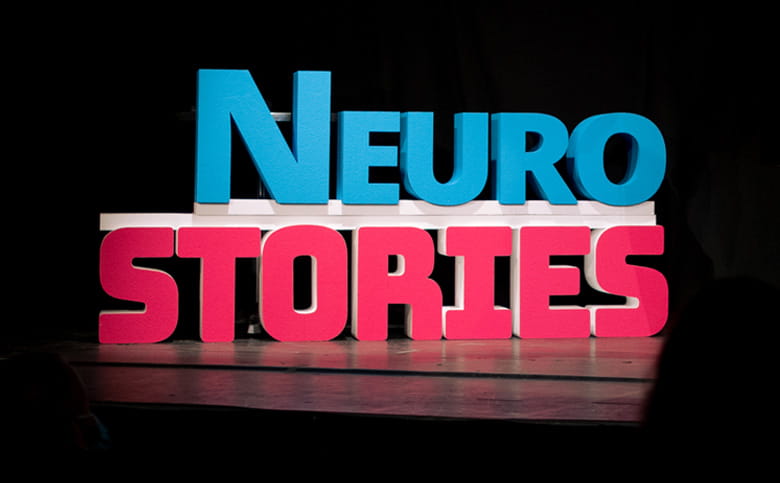
Neurostories 2021: a great success !
The event that took place on November 25 of 2021, hosted 150 attendees in the theater and 700 more online !
“Beyond the 5 senses”
“Beyond the five senses,” the theme proposed for this 3rd edition of the event, sparked an evident curiosity among the audience. Indeed, discovering senses that few people have heard of sometimes requires crossing the door of the world of research to get a glimpse. And what is better than a scientific team to take you on a tour of the unknown?

Intriguing presentations
The transmission of knowledge was the goal of our five brilliant speakers! NeuroMarseille solicited them in early 2021; they worked very hard with a coach to offer an accessible version of their results. They have succeeded in making us discover some of the unknown senses, such as, for example, nociception (the feeling of pain), or interoception (the internal perception of organs), thorough explanations, presentations of their work, and surprising experiments!
Did you know our speakers from NeuroMarseille?
You may have heard about Aziz Moqrich from the IBDM, a specialist in thermoception and nociception, who was the first post-doctoral student of the 2021 Nobel laureate, Pr Ardem Patapoutian! Felipe Pegado, from the LPC, a promising young researcher, works on how to improve learning to read to children, using innovative methods based on the use of other senses than the vision. Edith Ribot-Ciscar, who works at the LNSC, is a very skilled researcher who studies proprioception: the perception of the different parts of our body, thanks to microneurography!
International participation
In addition to the speakers mentioned above, two other speakers were also present from very far away! Indeed, Valérie Jessica Laporte, the author of the book Méconnaissable and the blog Bleuet atypique, is an autist and explained from Canada where she lives how she feels the senses in a very different way! As for Henry Evrard, who leads a research team on interoception at the Max Planck Institute in Germany, was connected from Shanghai, China, where he currently works! He explained how we feel the state of our organs, thanks to the nervous system.
Congratulations and thanks
To conclude on this superb evening, enlightened with astonishing demonstrations from all the researchers and surprising anecdotes from Valérie Jessica (a speaker whose humor delighted the audience), let us recall the formidable talent shown by our presenters Maxime Richardeau and Elodie Giorla: they animated the stage from the beginning to the end! We also thank the technical team In Media Res and the student’s society Neuronauts Association, who did an excellent job covering the evening online and on video! Finally, thanks to everyone involved in the event’s organization, making it remarkable: Sylvie Thirion, Anne-Marie François-Bellan, Thierry Cheminade, Guillaume Martinent, all Neuro-researchers, and Olivier Chabrol, our fantastic coach!
The NeuroMarseille team is pleased to have been able, despite the Covid crisis, to offer you a successful popularized science event and hope to see you again in a year for the next edition of the Neurostories!
Stay tuned !
Thanks to our partner In Media Res, the event was recorded on video! It will be available soon on our Youtube channel, and each speaker will have their dedicated section. Questions from the audience and specialist’s answers will be taken into account to complete the content of the speeches.
🔔 Attention: this event was in French
Feedback on the speakers’ topics is below! ️⬇️
LEARNING TO READ: A TEAMWORK OF OUR SENSES
To become a reader, we must learn to relate arbitrary visual symbols (letters) to the sounds of spoken language. After a few years of training in school, this correspondence between visible words and sounds of language becomes so automatic that the expert reader can literally "hear with his eyes." But can we facilitate this learning? Could other senses be allies?
MY AUTIST'S BRAIN - GUIDED TOUR
We are born, for the most part, with the same senses. But what if the way the brain processes sensory information was different from person to person?
Welcome to the story of an autistic and hypersensitive person who knows how to tell how their perceptions and the information they receive from the senses impact their daily lives.
INTERCEPTION, FROM THE HEART TO THE SKIN
Interoception is the sensory modality that allows us to feel what is going on in the organs of our body. Daily, this feeling takes the form of either distinct sensations such as hunger or abstract sensations commonly associated with emotions, such as "fear in the stomach." In either case, the purpose of interoception is to keep us alive, thus being the primary motivator of all life forms and one of the spearheads of the evolution of human subjective consciousness. From a public health perspective, interoception is increasingly taking its place in diagnosing psychopathologies, with the apparent beneficial effect of increasing awareness of the material "self" about the vagaries of our emotional experiences.
PROPRIOCEPTION: THIS FORGOTTEN SENSE WHICH STILL MAKES US INHABIT OUR BODY
Proprioception, this forgotten sense, plays an essential role in perceiving different parts of the body. The information from our muscles informs our brain about our attitudes and movements. But how can this information be modified during training? Are they the same depending on our emotional state?
THE SENSE OF TOUCH AND PAIN
Touch is an essential sense for the well-being and survival of human beings. We will see how tactile and painful information is detected, transmitted, and perceived under normal conditions. But also how this same information can be perceived unusually in pathological conditions. For these patients, are there any therapeutic avenues? How do basic and applied research contributions to it?





















